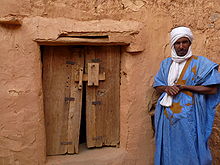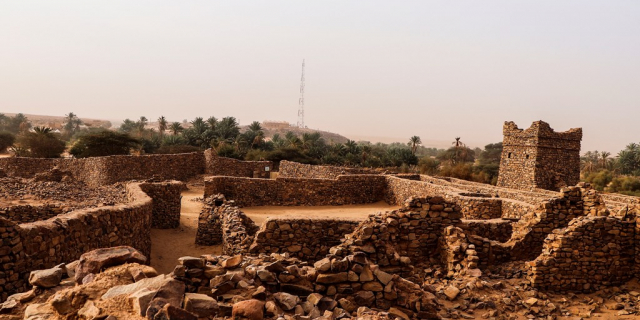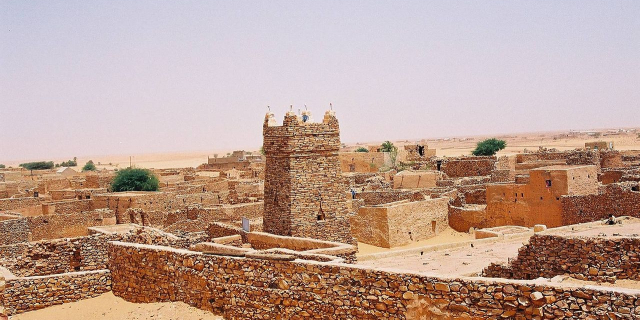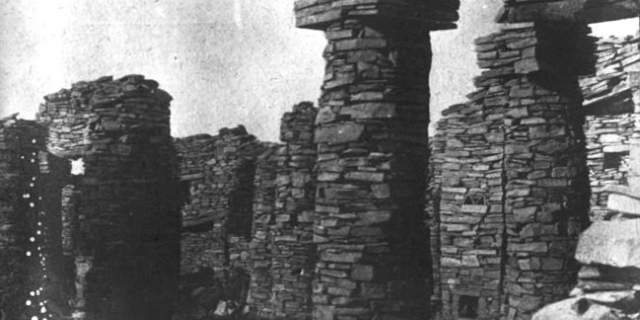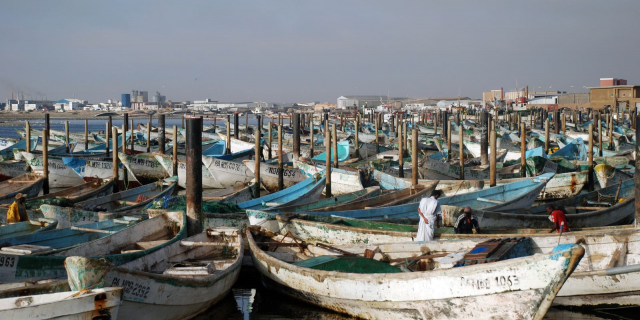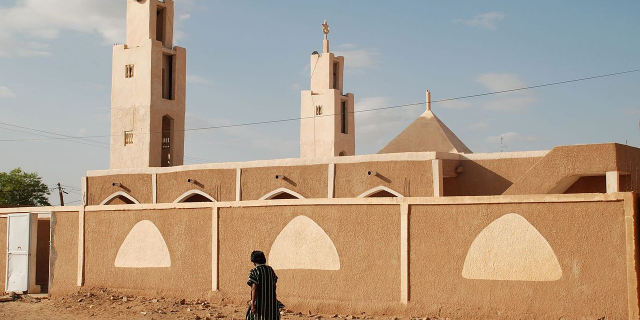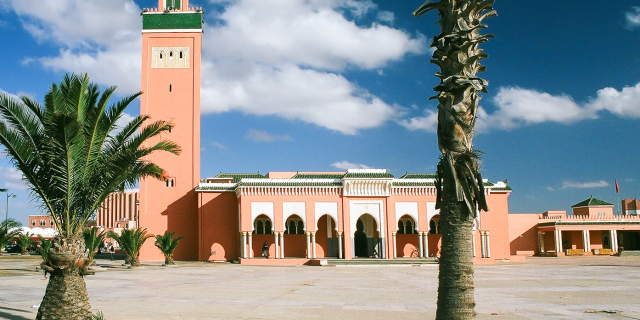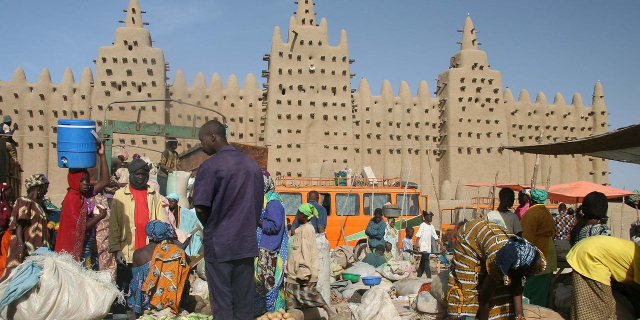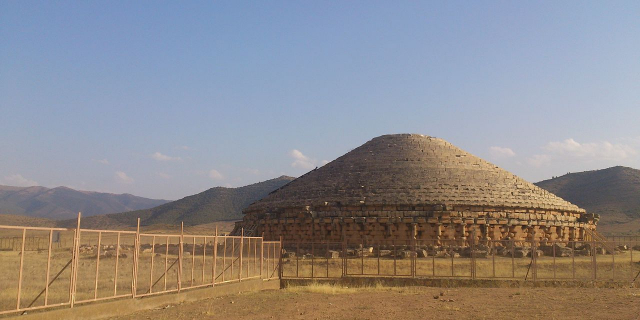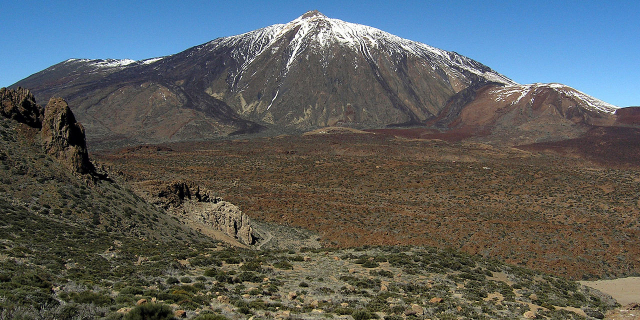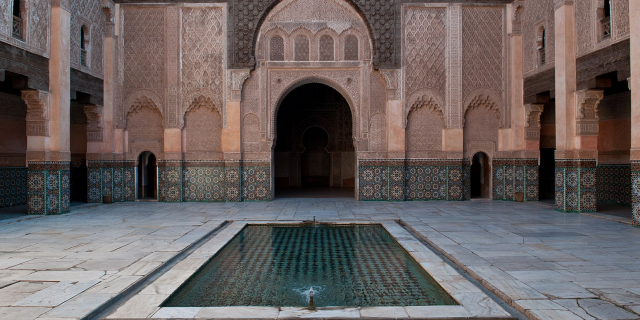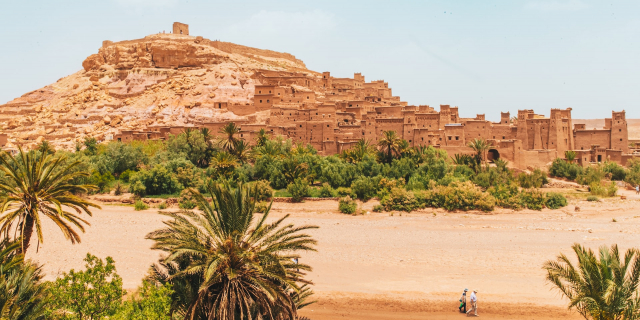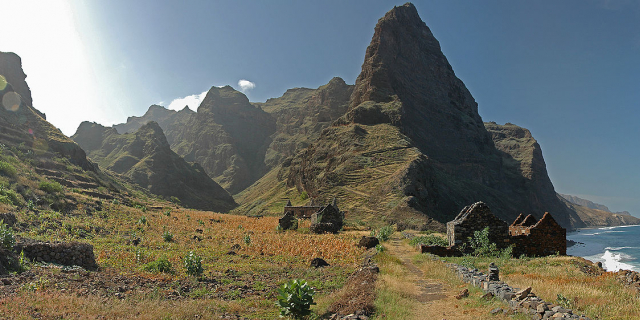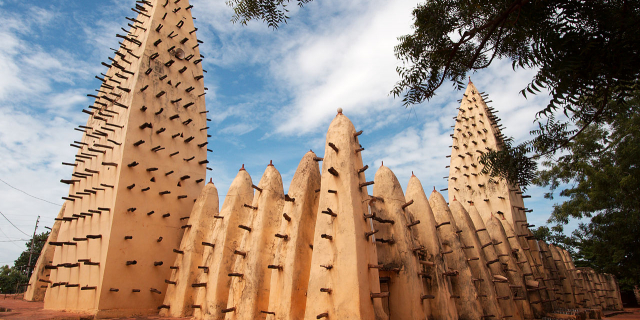Mauritania
Context of Mauritania
Mauritania, officially the Islamic Republic of Mauritania (Arabic: الجمهورية الإسلامية الموريتانية), is a sovereign country in Northwest Africa. It is bordered by the Atlantic Ocean to the west, Western Sahara to the north and northwest, Algeria to the northeast, Mali to the east and southeast, and Senegal to the southwest. Mauritania is the 11th-largest country in Africa and the 28th-largest in the world, and 90% of its territory is situated in the Sahara. Most of its population of 4.4 million lives in the temperate south of the country, with roughly one-third concentrated in the capital and largest city, Nouakchott, located on the Atlantic coast.
The country's name derives from the ancient Berber kingdom of Mauretania, located in North Africa within the ancient Maghreb. Berbers occupied what is now Mauritania beginning in ...Read more
Mauritania, officially the Islamic Republic of Mauritania (Arabic: الجمهورية الإسلامية الموريتانية), is a sovereign country in Northwest Africa. It is bordered by the Atlantic Ocean to the west, Western Sahara to the north and northwest, Algeria to the northeast, Mali to the east and southeast, and Senegal to the southwest. Mauritania is the 11th-largest country in Africa and the 28th-largest in the world, and 90% of its territory is situated in the Sahara. Most of its population of 4.4 million lives in the temperate south of the country, with roughly one-third concentrated in the capital and largest city, Nouakchott, located on the Atlantic coast.
The country's name derives from the ancient Berber kingdom of Mauretania, located in North Africa within the ancient Maghreb. Berbers occupied what is now Mauritania beginning in the third century AD. Arabs under the Umayyad Caliphate conquered the area in the late seventh century, bringing Islam, Arab culture, and the Arabic language. In the early 20th century, Mauritania was colonized by France as part of French West Africa. It achieved independence in 1960, but has since experienced recurrent coups and periods of military dictatorship. The most recent coup, in 2008, was led by General Mohamed Ould Abdel Aziz, who won subsequent presidential elections in 2009 and 2014. He was succeeded by Mohamed Ould Ghazouani following the 2019 elections, which were considered Mauritania's first peaceful transition of power since independence.
Mauritania is culturally and politically part of the Arab world; it is a member of the Arab League and Arabic is the sole official language. The official religion is Islam, and almost all inhabitants are Sunni Muslims. Despite its prevailing Arab identity, Mauritanian society is multiethnic; the Bidhan, or so-called "white moors", make up 30% of the population, while the Haratin, or so-called "black moors", comprise 40%. Both groups reflect a fusion of Arab-Berber ethnicity, language, and culture. The remaining 30% of the population comprises various sub-Saharan ethnic groups.
Despite an abundance of natural resources, including iron ore and petroleum, Mauritania remains poor; its economy is based primarily on agriculture, livestock, and fishing. Mauritania is known for its poor human-rights record, most notably the continued practice of slavery, a result of a historical caste system between the Bidhan and Haratin. It was the last country in the world to abolish slavery, in 1981, and criminalized it only in 2007.
More about Mauritania
- Calling code +222
- Internet domain .mr
- Mains voltage 220V/50Hz
- Democracy index 3.92
- Population 4614974
- Area 1030700
- Driving side right
- Early history
 Rock art in the Sahara Desert
Rock art in the Sahara DesertThe ancient tribes of Mauritania were Berber, Niger-Congo,[1] and Bafour peoples. The Bafour were among the first Saharan peoples to abandon their previously nomadic lifestyle and adopt a primarily agricultural one....Read more
Early historyRead less Rock art in the Sahara Desert
Rock art in the Sahara DesertThe ancient tribes of Mauritania were Berber, Niger-Congo,[1] and Bafour peoples. The Bafour were among the first Saharan peoples to abandon their previously nomadic lifestyle and adopt a primarily agricultural one. In response to the gradual desiccation of the Sahara, they eventually migrated southward.[2] Many of the Berber tribes have claimed to have Yemeni (and sometimes other Arab) origins. Little evidence supports those claims, although a 2000 DNA study of the Yemeni people did suggest some ancient connection might exist between the peoples.[3]
The Umayyads were the first Arab Muslims to enter Mauritania. During the Islamic conquests, they made incursions into Mauritania and were present in the region by the end of the seventh century.[4] Many Berber tribes in Mauritania fled the arrival of the Arabs to the Gao region in Mali.[4]
Other peoples also migrated south past the Sahara and into West Africa. According to a dubious Arab tradition[5][6] the Almoravids traveled south and conquered the ancient and extensive Ghana Empire around 1076.[7] From 1644 to 1674, the indigenous peoples of the area that is modern Mauritania made what became their final effort to repel the Yemeni Maqil Arabs who were invading their territory. This effort, which was unsuccessful, is known as the Char Bouba War. The invaders were led by the Beni Hassan tribe. The descendants of the Beni Hassan warriors became the upper stratum of Moorish society. Hassaniya, a bedouin Arabic dialect named for the Beni Hassan, became the dominant language among the largely nomadic population.[8]
Berbers retained a niche influence by producing the majority of the region's marabouts, as those who preserve and teach Islamic tradition there are called.[8]
Colonial historyThis section needs additional citations for verification. (September 2016) The Portuguese Empire ruled Arguin (Portuguese: Arguim) from 1445, after Prince Henry the Navigator set up a feitoria, until 1633.
The Portuguese Empire ruled Arguin (Portuguese: Arguim) from 1445, after Prince Henry the Navigator set up a feitoria, until 1633. After the Portuguese, the Dutch, and then the French, took control of Arguin until abandoning it in 1685.
After the Portuguese, the Dutch, and then the French, took control of Arguin until abandoning it in 1685.Starting in the late 19th century, France laid claim to the territories of present-day Mauritania, from the Senegal River area northwards. In 1901, Xavier Coppolani took charge of the imperial mission.[9] Through a combination of strategic alliances with Zawaya tribes and military pressure on the Hassane warrior nomads, he managed to extend French rule over the Mauritanian emirates. Beginning in 1903 and 1904, the French armies succeeded in occupying Trarza, Brakna, and Tagant, but the northern emirate of Adrar held out longer, aided by the anticolonial rebellion (or jihad) of shaykh Maa al-Aynayn and by insurgents from Tagant and the other occupied regions. In 1904, France organized the territory of Mauritania, and it became part of French West Africa, first as a protectorate and later as a colony. In 1912, the French armies defeated Adrar, and incorporated it into the territory of Mauritania.[10]
French rule brought legal prohibitions against slavery and an end to interclan warfare. During the colonial period, 90% of the population remained nomadic. Gradually, many individuals belonging to sedentary peoples, whose ancestors had been expelled centuries earlier, began to migrate into Mauritania. Until 1960, the capital of French West Africa was Saint-Louis, in Senegal. When Senegal gained its independence that year, France chose Nouakchott as the site of the new capital of Mauritania. At the time, Nouakchott was little more than a fortified village (or ksar).[11]
After Mauritanian independence, larger numbers of indigenous sub-Saharan African peoples (Haalpulaar, Soninke, and Wolof) migrated into it, most of them settling in the area north of the Senegal River. Many of these new arrivals had been educated in the French language and French customs, and became clerks, soldiers, and administrators in the new state. At the same time, the French were militarily suppressing the most intransigent Hassane tribes in the north. French pressure on those tribes altered the existing balance of power, and new conflicts arose between the southern populations and the Moors.[12][clarification needed][incomprehensible]
Modern-day slavery still exists in different forms in Mauritania.[13] According to some estimates, thousands of Mauritanians are still enslaved.[14][15][16] A 2012 CNN report, "Slavery's Last Stronghold", documents the ongoing slave-owning cultures.[17] This social discrimination is applied chiefly against the "black Moors" (Haratin) in the northern part of the country, where tribal elites among "white Moors" (Bidh'an, Hassaniya-speaking Arabs and Arabized Berbers) hold sway.[18] Slavery practices exist also within the sub-Saharan African ethnic groups of the south.
The great Sahel droughts of the early 1970s caused massive devastation in Mauritania, exacerbating problems of poverty and conflict. The arabized dominant elites reacted to changing circumstances, and to Arab nationalist calls from abroad, by increasing pressure to arabize many aspects of Mauritanian life, such as law and the education system. This was also a reaction to the consequences of the French domination under the colonial rule. Various models for maintaining the country's cultural diversity have been suggested, but none have been successfully implemented.
This ethnic discord was evident during intercommunal violence that broke out in April 1989 (the "Mauritania–Senegal Border War"), but has since subsided. Mauritania expelled some 70,000 sub-Saharan African Mauritanians in the late 1980s.[19] Ethnic tensions and the sensitive issue of slavery – past and, in some areas, present – are still powerful themes in the country's political debate. A significant number from all groups seek a more diverse, pluralistic society.
Conflict with Western Sahara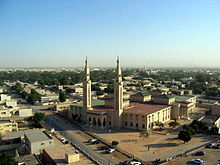 Nouakchott is the capital and the largest city of Mauritania. It is one of the largest cities in the Sahara.
Nouakchott is the capital and the largest city of Mauritania. It is one of the largest cities in the Sahara.The International Court of Justice has concluded that in spite of some evidence of both Morocco's and Mauritania's legal ties prior to Spanish colonization, neither set of ties was sufficient to affect the application of the UN General Assembly Declaration on the Granting of Independence to Colonial Countries and Peoples to Western Sahara.[20]
Mauritania, along with Morocco, annexed the territory of Western Sahara in 1976, with Mauritania taking the lower one-third at the request of Spain, a former imperial power. After several military losses to the Polisario – heavily armed and supported by Algeria, the regional power and rival to Morocco – Mauritania withdrew in 1979. Its claims were taken over by Morocco.
Due to economic weakness, Mauritania has been a negligible player in the territorial dispute, with its official position being that it wishes for an expedient solution that is mutually agreeable to all parties. While most of Western Sahara has been occupied by Morocco, the UN still considers the Western Sahara a territory that needs to express its wishes with respect to statehood. A referendum, originally scheduled for 1992, is still supposed to be held at some point in the future, under UN auspices, to determine whether or not the indigenous Sahrawis wish to be independent, as the Sahrawi Arab Democratic Republic, or to be part of Morocco.
Ould Daddah era (1960–1978)Mauritania became an independent nation in November 1960.[21] In 1964 President Moktar Ould Daddah, originally installed by the French, formalized Mauritania as a one-party state with a new constitution, setting up an authoritarian presidential regime. Daddah's own Parti du Peuple Mauritanien became the ruling organization in a one-party system. The President justified this on the grounds that Mauritania was not ready for western-style multiparty democracy. Under this one-party constitution, Daddah was re-elected in uncontested elections in 1976 and 1978.
Daddah was ousted in a bloodless coup on 10 July 1978. He had brought the country to near-collapse through the disastrous war to annex the southern part of Western Sahara, framed as an attempt to create a "Greater Mauritania".
CMRN and CMSN military governments (1978–1984)Chinguetti was a center of Islamic scholarship in West Africa.Col. Mustafa Ould Salek's Military Committee for National Recovery junta proved incapable of either establishing a strong base of power or extracting the country from its destabilizing conflict with the Sahrawi resistance movement, the Polisario Front. It quickly fell, to be replaced by another military government, the Military Committee for National Salvation.
The energetic Colonel Mohamed Khouna Ould Haidallah soon emerged as its strongman. By giving up all claims to Western Sahara, he found peace with the Polisario and improved relations with its main backer, Algeria, but relations with Morocco, the other party to the conflict, and its European ally France, deteriorated. Instability continued, and Haidallah's ambitious reform attempts foundered. His regime was plagued by attempted coups and intrigue within the military establishment. It became increasingly contested due to his harsh and uncompromising measures against opponents; many dissidents were jailed, and some executed. In 1981, slavery was formally abolished by law, making Mauritania the last country in the world to do so.
Ould Taya's rule (1984–2005)In December 1984, Haidallah was deposed by Colonel Maaouya Ould Sid'Ahmed Taya, who, while retaining tight military control, relaxed the political climate.
Ould Taya moderated Mauritania's previous pro-Algerian stance, and re-established ties with Morocco during the late 1980s. He deepened these ties during the late 1990s and early 2000s, as part of Mauritania's drive to attract support from Western states and Western-aligned Arab states. Mauritania has not rescinded its recognition of Polisario's Western Saharian exile government, and remains on good terms with Algeria. Its position on the Western Sahara conflict has been, since the 1980s, one of strict neutrality.
The Mauritania–Senegal Border War started as a result of a conflict in Diawara between Moorish Mauritanian herders and Senegalese farmers over grazing rights.[22] On 9 April 1989, Mauritanian guards killed two Senegalese.[23] Following the incident, several riots erupted in Bakel, Dakar and other towns in Senegal, directed against the mainly Arabized Mauritanians who dominated the local retail business. The rioting, adding to already existing tensions, led to a campaign of terror against black Mauritanians,[24] who are often seen as 'Senegalese' by Bidha'an, regardless of their nationality. As low scale conflict with Senegal continued into 1990/91, the Mauritanian government engaged in or encouraged acts of violence and seizures of property directed against the Halpularen ethnic group. The tension culminated in an international airlift agreed to by Senegal and Mauritania under international pressure to prevent further violence. The Mauritanian Government expelled thousands of black Mauritanians. Most of these so-called 'Senegalese' had few or no ties with Senegal, and many have been repatriated from Senegal and Mali after 2007.[25] The exact number of expulsions is not known but the United Nations High Commissioner for Refugees (UNHCR) estimates that, as of June 1991, 52,995 Mauritanian refugees were living in Senegal and at least 13,000 in Mali.[26]: 27
Opposition parties were legalized and a new Constitution approved in 1991 which put an end to formal military rule. However, President Ould Taya's election wins were dismissed as fraudulent by some opposition groups.
In the late 1980s, Ould Taya had established close co-operation with Iraq, and pursued a strongly Arab nationalist line. Mauritania grew increasingly isolated internationally, and tensions with Western countries grew dramatically after it took a pro-Iraqi position during the 1991 Gulf War. During the mid-to late 1990s, Mauritania shifted its foreign policy to one of increased co-operation with the US and Europe. It was rewarded with diplomatic normalization and aid projects. On 28 October 1999, Mauritania joined Egypt, Palestine, and Jordan as the only members of the Arab League to officially recognize Israel. Ould Taya also started co-operating with the United States in anti-terrorism activities, a policy that was criticized by some human rights organizations.[27][28] (See also Foreign relations of Mauritania.)
During the regime of President Ould Taya Mauritania developed economically, oil was discovered in 2001 by the Woodside Company.[29]
August 2005 military coupOn 3 August 2005, a military coup led by Colonel Ely Ould Mohamed Vall ended President Maaouya Ould Sid'Ahmed Taya's twenty-one years of rule. Taking advantage of Ould Taya's attendance at the funeral of Saudi King Fahd, the military, including members of the presidential guard, seized control of key points in the capital Nouakchott. The coup proceeded without loss of life. Calling themselves the Military Council for Justice and Democracy, the officers released the following statement:
"The national armed forces and security forces have unanimously decided to put a definitive end to the oppressive activities of the defunct authority, which our people have suffered from during the past years."[30]The Military Council later issued another statement naming Colonel Mohamed Vall as president and director of the national police force, the Sûreté Nationale. Vall, once regarded as a firm ally of the now-ousted president, had aided Ould Taya in the coup that had originally brought him to power, and had later served as his security chief. Sixteen other officers were listed as members of the council.
Though cautiously watched by the international community, the coup came to be generally accepted, with the military junta organizing elections within a promised two-year timeline. In a referendum on 26 June 2006, Mauritanians overwhelmingly (97%) approved a new constitution that limited the duration of a president's stay in office. The leader of the junta, Col. Vall, promised to abide by the referendum and relinquish power peacefully. Mauritania's establishment of relations with Israel – it is one of only three Arab states to recognize Israel – was maintained by the new regime, despite widespread criticism from the opposition. They considered that position as a legacy of the Taya regime's attempts to curry favor with the West.
Parliamentary and municipal elections in Mauritania took place on 19 November and 3 December 2006.
2007 presidential elections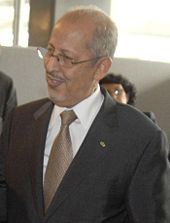 Sidi Ould Cheikh Abdallahi
Sidi Ould Cheikh AbdallahiMauritania's first fully democratic presidential elections took place on 11 March 2007. The elections effected the final transfer from military to civilian rule following the military coup in 2005. This was the first time since Mauritania gained independence in 1960 that it elected a president in a multi-candidate election.[31]
The elections were won in a second round of voting by Sidi Ould Cheikh Abdallahi, with Ahmed Ould Daddah a close second.
2008 military coupOn 6 August 2008, the head of the presidential guards took over the president's palace in Nouakchott, a day after 48 lawmakers from the ruling party resigned in protest of President Abdallahi's policies.[which?] The army surrounded key government facilities, including the state television building, after the president fired senior officers, one of them the head of the presidential guards.[32] The President, Prime Minister Yahya Ould Ahmed Waghef, and Mohamed Ould R'zeizim, Minister of Internal Affairs, were arrested.
The coup was coordinated by General Mohamed Ould Abdel Aziz, former chief of staff of the Mauritanian Army and head of the presidential guard, who had recently been fired. Mauritania's presidential spokesman, Abdoulaye Mamadouba, said the President, Prime Minister, and Interior Minister had been arrested by renegade Senior Mauritanian army officers and were being held under house arrest at the presidential palace in the capital.[33][34][35] In the apparently successful and bloodless coup, Abdallahi's daughter, Amal Mint Cheikh Abdallahi, said: "The security agents of the BASEP (Presidential Security Battalion) came to our home and took away my father."[36] The coup plotters, all dismissed in a presidential decree shortly beforehand, included Abdel Aziz, General Muhammad Ould Al-Ghazwani, General Philippe Swikri, and Brigadier General (Aqid) Ahmad Ould Bakri.[37]
After the coup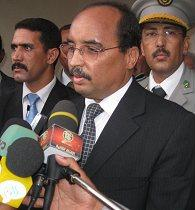 Mohamed Ould Abdel Aziz in his hometown, Akjoujt, on 15 March 2009
Mohamed Ould Abdel Aziz in his hometown, Akjoujt, on 15 March 2009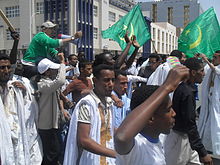 2011–12 Mauritanian protests
2011–12 Mauritanian protestsA Mauritanian lawmaker, Mohammed Al Mukhtar, claimed that many of the country's people supported the takeover of a government that had become "an authoritarian regime" under a president who had "marginalized the majority in parliament."[38] The coup was also backed by Abdallahi's rival in the 2007 election, Ahmed Ould Daddah. However, Abdel Aziz's regime was isolated internationally, and became subject to diplomatic sanctions and the cancellation of some aid projects. It found few foreign supporters (among them Morocco, Libya and Iran), while Algeria, the United States, France and other European countries criticized the coup, and continued to refer to Abdallahi as the legitimate president of Mauritania. Domestically, a group of parties coalesced around Abdallahi to continue protesting the coup, which caused the junta to ban demonstrations and crack down on opposition activists. International and internal pressure eventually forced the release of Abdallahi, who was instead placed under house arrest in his home village. The new government broke off relations with Israel. In March 2010, Mauritania's female foreign minister Mint Hamdi Ould Mouknass announced that Mauritania had cut ties with Israel in a "complete and definitive way."[39]
After the coup, Abdel Aziz insisted on holding new presidential elections to replace Abdallahi, but was forced to reschedule them due to internal and international opposition. During the spring of 2009, the junta negotiated an understanding with some opposition figures and international parties. As a result, Abdallahi formally resigned under protest, as it became clear that some opposition forces had defected from him and most international players, notably including France and Algeria, now aligned with Abdel Aziz. The United States continued to criticize the coup, but did not actively oppose the elections.
Aziz eraAbdallahi's resignation allowed the election of Abdel Aziz as civilian president, on 18 July, by a 52% majority. Many of Abdallahi's former supporters criticised this as a political ploy and refused to recognize the results. They argued that the election had been falsified due to junta control, and complained that the international community had let down the opposition. Despite complaints, the elections were almost unanimously accepted by Western, Arab and African countries, which lifted sanctions and resumed relations with Mauritania. By late summer, Abdel Aziz appeared to have secured his position and to have gained widespread international and internal support. Some figures, such as Senate chairman Messaoud Ould Boulkheir, continued to refuse the new order and call for Abdel Aziz's resignation.
In February 2011, the waves of the Arab Spring spread to Mauritania, where thousands of people took to the streets of the capital.[40]
In November 2014, Mauritania was invited as a non-member guest nation to the G20 summit in Brisbane.[41]
The national flag of Mauritania was changed on 4 August 2017. Two red stripes were added as a symbol of the country's sacrifice and defense.[42]
In August 2019, Mohamed Ould Ghazouani was sworn in as Mauritania's tenth president since its independence from France in 1960.[43] His predecessor Mohamed Ould Abdel Aziz ran the country for 10 years. The ruling party Union for the Republic (UPR) was founded by Aziz in 2009.[44]
In June 2021, former president Abdel Aziz was arrested amidst a corruption probe into allegations of embezzlement,[45] following a parliamentary inquiry which was launched in the fall of 2019.[45]
^ Stokes, James, ed. (2009). Encyclopedia of the Peoples of Africa and the Middle East. Infobase Publishing. p. 450. ISBN 9781438126760. Retrieved 13 October 2019. ^ Suarez, David (2016). The Western Sahara and the Search for the Roots of Sahrawi National Identity (Thesis). Florida International University. doi:10.25148/etd.fidc001212. ^ Chaabani, H.; Sanchez-Mazas, A.; Sallami SF (2000). "Genetic differentiation of Yemeni people according to rhesus and Gm polymorphisms". Annales de Génétique. 43 (3–4): 155–62. doi:10.1016/S0003-3995(00)01023-6. PMID 11164198. ^ a b Sabatier, Diane Himpan; Himpan, Brigitte (28 June 2019). Nomads of Mauritania - Diane Himpan Sabatier, Brigitte Himpan - Google Books. ISBN 9781622735822. Retrieved 30 September 2022. ^ Masonen, Pekka; Fisher, Humphrey J. (1996). "Not quite Venus from the waves: The Almoravid conquest of Ghana in the modern historiography of Western Africa" (PDF). History in Africa. 23: 197–232. doi:10.2307/3171941. JSTOR 3171941. S2CID 162477947. Archived from the original (PDF) on 7 September 2011. Retrieved 16 October 2021. ^ Insoll, T (2003). The Archaeology of Islam in Sub-Saharan Africa. Cambridge: Cambridge University Press. p. 230. ^ Velton, Ross (2009). Mali: The Bradt Safari Guide. Bradt Travel Guides. p. 15. ISBN 978-1-84162-218-7. Archived from the original on 22 May 2020. Retrieved 7 June 2020. ^ a b "Mauritania - History". Country Studies. Library of Congress. Archived from the original on 3 November 2016. ^ Keenan, Jeremy, ed. (18 October 2013). The Sahara. doi:10.4324/9781315869544. ISBN 9781315869544. ^ "Mauritania: History". www.infoplease.com. Archived from the original on 2 February 2017. Retrieved 16 January 2017. ^ Pazzanita, Anthony G. (2008). Historical Dictionary of Mauritania. Lanham, Md.: Scarecrow Press. ISBN 978-0-8108-6265-4. Archived from the original on 22 May 2020. Retrieved 7 June 2020. page 369. ^ "Mauritanian MPs pass slavery law" Archived 9 July 2018 at the Wayback Machine, BBC News. 9 August 2007. ^ Yasser, Abdel Nasser Ould (2008). Sage, Jesse; Kasten, Liora (eds.). Enslaved: True Stories of Modern Day Slavery. Macmillan. ISBN 978-1-4039-7493-8. Archived from the original on 6 September 2015. Retrieved 20 June 2015. ^ "Mauritania made slavery illegal last month". South African Institute of International Affairs. 6 September 2007. Archived from the original on 21 November 2010. ^ "BBC World Service - The Abolition season on BBC World Service". www.bbc.co.uk. Archived from the original on 3 June 2011. Retrieved 24 October 2009. ^ "Mauritania (Tier 3)" (PDF). Report. US Dept. of State. pp. 258–59. Archived (PDF) from the original on 9 January 2020. Retrieved 7 June 2020. ^ "Slavery's last stronghold" Archived 29 March 2013 at the Wayback Machine, CNN.com (16 March 2012). Retrieved 20 March 2012. ^ "Freedom Fighter: A slaving society and an abolitionist’s crusade" Archived 26 June 2015 at the Wayback Machine, New Yorker, 8 September 2014 ^ MAURITANIA: Fair elections haunted by racial imbalance Archived 25 March 2009 at the Wayback Machine, IRIN News. 5 March 2007. ^ "Cour internationale de Justice - International Court of Justice". www.icj-cij.org. Archived from the original on 18 February 2017. Retrieved 17 February 2017. ^ Meredith, Martin (2005), The Fate of Africa: A History of Fifty Years of Independence, New York: Public Affairs Publishing, p. 69, ISBN 978-1610390712 ^ "Inventory of Conflict and Environment (ICE), Template". American University. Archived from the original on 17 February 2012. Retrieved 20 March 2012. ^ Diallo, Garba (1993). "Mauritania, a new Apartheid?" (PDF). bankie.info. Archived from the original (PDF) on 6 December 2011. ^ Duteil, Mireille (1989). "Chronique mauritanienne". Annuaire de l'Afrique du Nord (in French). Vol. XXVIII (du CNRS ed.). ^ Sy, Mahamadou (2000). L'Harmattan (ed.). "L'enfer de Inal". Mauritanie, l'horreur des camps. Paris. Archived from the original on 21 October 2013. Retrieved 10 August 2012. ^ "Mauritania's campaign of terror, State-Sponsored Repression of Black Africans" (PDF). Human Rights Watch/Africa (formerly Africa Watch). 1994. Archived (PDF) from the original on 20 May 2019. Retrieved 7 June 2020. ^ "Crackdown courts U.S. approval". CNN. 24 November 2003. Archived from the original on 7 April 2008. Retrieved 6 August 2008. ^ "Mauritania: New wave of arrests presented as crackdown on Islamic extremists". IRIN Africa. 12 May 2005. Archived from the original on 29 November 2006. Retrieved 6 August 2008. ^ "Woodside to pump Mauritania oil". 31 May 2004. Retrieved 26 September 2021. ^ "Mauritania officers 'seize power'". BBC News. 4 August 2005. Archived from the original on 7 August 2008. Retrieved 6 August 2008. ^ "Mauritania vote 'free and fair'". BBC News. 12 March 2007. Archived from the original on 15 December 2018. Retrieved 6 August 2008. ^ "48 lawmakers resign from ruling party in Mauritania". Tehran Times. 6 August 2008. Archived from the original on 6 December 2008. ^ "Coup in Mauritania as president, PM arrested". AFP. 6 August 2008. Archived from the original on 9 August 2008. Retrieved 4 July 2010. ^ "Troops stage 'coup' in Mauritania". BBC News. 6 August 2008. Archived from the original on 7 August 2008. Retrieved 4 July 2010. ^ "Coup under way in Mauritania: president's office". Archived from the original on 12 August 2008. Retrieved 6 August 2008.. ap.google.com ^ McElroy, Damien (6 August 2008). "Mauritania president under house arrest as army stages coup". The Daily Telegraph. UK. Archived from the original on 23 June 2018. Retrieved 4 July 2010. ^ Vinsinfo. "themedialine.org, Generals Seize Power in Mauritanian Coup". Themedialine.org. Archived from the original on 10 August 2008. Retrieved 4 July 2010. ^ Mohamed, Ahmed. "Renegade army officers stage coup in Mauritania". Archived from the original on 19 August 2008. Retrieved 6 August 2008.. ap.google.com (6 August 2008) ^ "Mauritania Affirms Break with Israel". Voice of America News. 21 March 2010. Archived from the original on 28 March 2010. Retrieved 4 July 2010. ^ Adams, Richard (25 February 2011). "Libya's turmoil". The Guardian. London. Archived from the original on 28 June 2019. Retrieved 7 June 2020. ^ "G20 summit: World leaders gather in Brisbane". BBC News. 14 November 2014. ^ Quito, Anne (8 August 2017). "Mauritania has a new flag". Quartz. ^ "Ghazouani sworn in as new Mauritanian president". www.aa.com.tr. Retrieved 27 July 2021. ^ "Mauritania's new president sets down his mark". January 2020. ^ a b "Mauritania arrests former president amid corruption probe". Reuters. 23 June 2021. Retrieved 7 December 2021.
- Stay safe
 WARNING: Do not criticise or show any kind of disrespect to Islam. Avoid religious discussions if you can.
WARNING: Do not criticise or show any kind of disrespect to Islam. Avoid religious discussions if you can.
Mauritanian authorities treat religious offences extremely seriously and the death penalty is statuatory for proselytisation, expressing secular viewpoints, and engaging in acts deemed "blasphemous" or "sacrilegious".
LGBT activities are seen as severe offences and they are punishable by death. If you fit in this category, it is recommended that you stay out of Mauritania.
Fishing boats in Banc d'Arguin National ParkThe area near the Western Sahara is heavily mined and travel through this area is highly inadvisable. Border areas lining Algeria and Mali are notorious for banditry. The single paved road coming from Morocco is especially dangerous, having been the site of Al Qaida kidnappings. If you must travel on this path, it is best to do so in a tight caravan. In other areas, one should avoid flaunting wealth or expensive wares. Daunting though it may seem, a bit of research and common sense will ensure a pleasant trip in Mauritania.
...Read moreStay safeRead less WARNING: Do not criticise or show any kind of disrespect to Islam. Avoid religious discussions if you can.
WARNING: Do not criticise or show any kind of disrespect to Islam. Avoid religious discussions if you can.
Mauritanian authorities treat religious offences extremely seriously and the death penalty is statuatory for proselytisation, expressing secular viewpoints, and engaging in acts deemed "blasphemous" or "sacrilegious".
LGBT activities are seen as severe offences and they are punishable by death. If you fit in this category, it is recommended that you stay out of Mauritania.
Fishing boats in Banc d'Arguin National ParkThe area near the Western Sahara is heavily mined and travel through this area is highly inadvisable. Border areas lining Algeria and Mali are notorious for banditry. The single paved road coming from Morocco is especially dangerous, having been the site of Al Qaida kidnappings. If you must travel on this path, it is best to do so in a tight caravan. In other areas, one should avoid flaunting wealth or expensive wares. Daunting though it may seem, a bit of research and common sense will ensure a pleasant trip in Mauritania.
Check your embassy or consulate travel advisories carefully. Due to increasing numbers of attacks on Westerners in the past several years, most Western nations advise great caution. Resident expatriates travel between cities by day, in groups and on major routes.





